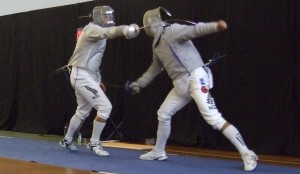 Christchurch fencer Luke Robertson will be a leading contender in the National Championships in Wellington on November 19-21. Peter Campbell talks to the man others call El Toro.
Christchurch fencer Luke Robertson will be a leading contender in the National Championships in Wellington on November 19-21. Peter Campbell talks to the man others call El Toro.
Charging feet thunder, metal clashes. It’s Monday evening and New Zealand’s reigning sabre champion is polishing his lunges and ripostes.
“When I step onto the piste and put my mask on, I see a red mist. Nothing matters except the referee and my opponent and how I am going to score one more point against him than he does against me,” explains Luke Robertson.
The ruggedly built, 32-year-old was given the nickname El Toro (the Bull) while training in Spain. It describes the solid determination which took him to the Commonwealth Games last year and which will keep him going till the next games in 2014.
On the piste he has an imposing presence, bullying his opponents and the referee. Taking off his mask his personality changes, he speaks softly and calmly. It’s hard to believe it’s the same person.
His trainer, Vik Manage, attributes Robertson’s success to one thing. “He’s motivated. I think he’s finally starting to believe it himself now. For a long time, he just thought he was bloody-minded.”
Robertson started fencing in 1993 and though he has had breaks from the sport, he has always come back and performed at a high level.
“He came back to me after about four years without fencing in 2002 and said he wanted to go to Spain with me to train. I was willing to take him but he wasn’t in condition.” Manuge will train only fencers who have shown an ability to work hard and goes overseas only with those who can handle the intensity.
Robertson says: “The first day I started training with Vik, he took me for a run and I blew out both of my patellae (knee caps). It took me six weeks of physio before I could start training again.”
To go overseas Robertson was given a tough task. “I needed to lose 30kg. After school I stopped fencing, made some bad lifestyle choices and put on a lot of weight.
“I was given some rules about eating. I was allowed to eat as many fruit and veges as I liked but I was given a bowl and I was only allowed to eat three bowls worth of food a day. It didn’t matter how much food I put in the bowl, I could stack it, I could dice it, anything I wanted, but if it fell out of the bowl I wasn’t allowed to eat it.
“To start with I was allowed five bowls, and combined with exercise lost 2.5 kg a week until it started to even out, then I dropped back to four bowls.”
It took him eight months to lose 30kg. What’s more, he’s kept it off.
“Keeping it off is much harder than losing it in the first place.”
Having knocked off the kilos Robertson had to improve his intensity and it is here again that his bull-like stubbornness has borne results. Manuge says training is tough in Europe. “Fencers overseas train five to six days a week and participate in tournaments throughout Europe on the weekends.
“I have tasks to test their readiness. Basically they need to be able to do 50 push-ups, 50 sit ups and 50 seal-arches and then go for a sprint. We will go to the Bridle Path and they have to run up the track and back twice within an hour. If they’re not back in time they have to run home.”
That’s motivation for you.
Robertson says: “It takes 14 minutes to reach the top and nine minutes to get down.
“Another task he gets me to do is to run around the block which is 1.1 km. I am so competitive that if Vik says I can’t do it in three minutes, I will keep doing it till I can.”
As Manuge says, Robertson is a hard worker.
“I have to push past the pain barrier all the time. I guess what motivates me is that I am extremely competitive.”
But bullish though he might be on the fencing piste Robertson’s competitive motivation is not so much aimed at defeating others but perfecting himself.
Robertson accepts that he still has a lot to learn: “You can learn from anyone, even beginners can show you something unexpected.”
Manuge agrees: “Fencing is something you can learn in a few years but takes a lifetime to master.”
This approach to self improvement is one of the keys behind Robertson’s motivation.
“It’s the desire to improve. I actually prefer training to competing. It’s about getting things right and feeling that I’m improving.
It’s a principle he applies elsewhere in his life. Working for Texture Plants, where he has worked since leaving school in 1997, Robertson experiences the same challenge. “You can always try to grow a better tree the next season.”
It brings home another challenge that the lesser known sports face. Sportspeople have to fit in their sport around work and family.
“Last year for the Commonwealth Champs I was training 15 hours a week.”
Although it mightn’t sound like a huge commitment of time, it does amount to two hours each day that has to be fitted around work, and this can place stresses on loved ones.
“For a relationship to work your partner really has to buy into your dream and your passion. They have to understand what you are doing and why you are doing it and what it means to you. They have to be part of that dream. If they’re not, then it won’t work.”
For this reason Robertson has reduced his training this year to about five hours a week so that he can spend more time with his partner.
“It’s about balance. Last year was the Commonwealth Games, this year is about her.”
Although Robertson aspires to participate in the 2014 Commonwealth Games, he has more immediate short-term goals.
“I want to be the first person to win the New Zealand Nationals more than four years running.”
Fencing has a strong physical element to it. Fencers need to be fit, strong and fast but technique is crucial and can often make up for failings in other areas.
“You need to be able to think,” says Manuge. “It’s something that can be taught. But you need to be prepared to work hard, and that really is the key.”
The greater the competition though, the more you need to think. Robertson explains that in the build-up to the Commonwealth Games last year he carefully watched videos of his opponents to learn how they fenced.
“It’s much easier fencing someone who you know than trying to work him out on the piste.”
He watches his opponents and also the referees to see how they interpret the rules.
When it comes to competing, Robertson is similarly careful about his preparation.
“I am careful about my diet. Two days out I eat a lot of protein to make sure the muscles are in good condition. The night before competing I eat carbs and drink a beer. This helps relax me for the following day.”
Despite the effort involved in staying in condition and staying on top of the competition Robertson is clearly intent on staying in the sport for the foreseeable future.
“I started fencing because they said my knees were too bad for rugby. So I chose probably the worst sport in the world for knees. Nowadays, I just keep fencing. It keeps the weight off,” he says with a grin. “I guess it’s an addiction.”
Addiction or not, Robertson has clear goals and believes in them. He’s not afraid of putting in the hard miles to achieve them.
“If you work hard enough, in the end you get what you want.”
Copyright © Peter Campbell 2013, www.intrepid-adventure.com



